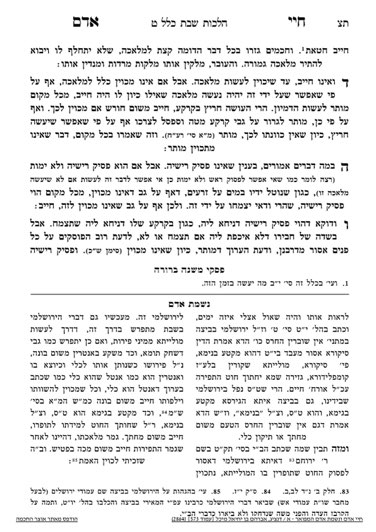We are continuing in siman 6, discussing the concept of psik reisha d’lo nicha lei, which refers to a psik reisha in which a person does not care about the result. D’lo nicha lei can include both when a person actively dislikes the result and when they are ambivalent to the result. We learned that, according to the Aruch, psik reisha d’lo nicha lei is muttar, even if the melacha in question is deoraysa. Other poskim disagree, and hold that a psik reisha on a melacha deoraysa d’lo nicha lei is assur.
Regarding a psik reisha on an issur derabanan, the Mishnah Berurah understands that there is a machlokes Shulchan Aruch and Rema. in siman 314, seif 1, the Shulchan Aruch appears to be of the opinion that psik reisha on an issur derabanan is muttar (even when nicha lei, that the person wants the result), and the Rema disagrees. The Mishnah Berurah says that we follow the opinion of the Rema, that a psik reisha on an issur derabanan is assur.
Regarding a psik reisha d’lo nicha lei, the Mishnah Berurah appears to hold it would be assur as well. One place where he seems to indicate this opinion is regarding the case of opening the door, where the concern is that the candles will be extinguished by opening the door (see shiur S272). Since extinguishing the candles is a melacha she’einah tzriacha legufah, the issur in question is an issur derabanan, and it is certainly lo nicha lei for the candles to go out. Nevertheless, the halacha is that it would be assur to open the door if it is a psik reisha that the candles will be extinguished. There are other places where the Mishnah Berurah indicates it would be assur as well.
On the other hand, there are other cases of psik reisha derabanan d’lo nicha lei in the Mishnah Berurah where he holds it is muttar if there is a compelling reason. We must remember that we are beginning with an assur derabanan, and the Mishnah Berurah is willing to permit this issur derabanan in cases of tzaar, mitzvah or other pressing need. One example is in siman 316, which deals with a case of a person trying to shut the door because it is cold, but an animal has walked inside the house such that closing the door will trap the animal. Since the person is not attempting to take possession of the animal, and the level of enclosure is a larger area, the tzeida (trapping) is an issur derabanan, so it is muttar in a case of tzaar (i.e, due to the cold).
In a case of a double derabanan, the Mishnah Berurah seems to indicate it is assur. However, if it is a psik reisha d’lo nicha lei, the Mishnah Berurah indicates it is muttar even without the qualifier of tzaar, mitzvah or other pressing need. Although he indicates it is not like this in other places, this seems to be his final psak.
Summary
- Davar she’eino miskavein is the general Torah concept of performing one action with an unintended aveirah which may occur in addition. We pasken in accordance with Rav Shimon, that it is muttar
- However, if it is inevitable that the unintended aveirah will occur, it is called a psik reisha that the unintended action will occur, and one becomes chayav mideoraysa for causing that unintended assur action to occur.
- If it is karov l’psik reisha, many consider it a psik reisha; however, Rabbi Reingold’s mesorah is not to treat it as psik reisha but rather as a davar she’eino miskavein.
- A safeik l’she’avar is treated like a psik reisha when the safeik is a safeik deoraysa. When the safeik is a safeik derabanan, some are meikil to treat it like a davar she’eino miskavein
- If the psik reisha is lo nicha lei, we still pasken it is assur miderabanan, although the Aruch holds it becomes muttar. However, if the issur in question is only assur miderabanan, we are matir in cases of tzaar, mitzvah or other significant need.
- In cases of psik reisha d’lo nicha lei on a double derabanan, the Mishnah Berurah is matir without any qualifications.



